The 2013 MacBook Air Review (13-inch)
by Anand Lal Shimpi on June 24, 2013 12:01 AM ESTPCIe SSD Performance
I created a Boot Camp partition of around 120GB and ran our client iometer benchmarks to put the new PCIe SSD’s performance in perspective.
Peak random read performance is roughly comparable to the previous-generation Samsung controller. Random write performance took a bit of a hit but it's still more than fast enough for client workloads. Sequential speeds are much improved but the gains are really only visible at high queue depths. Low queue depth sequential transfers can’t be split up enough in order to really require PCIe.
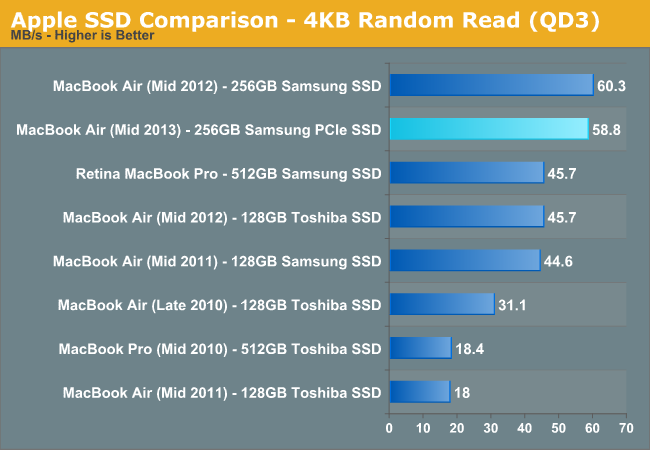
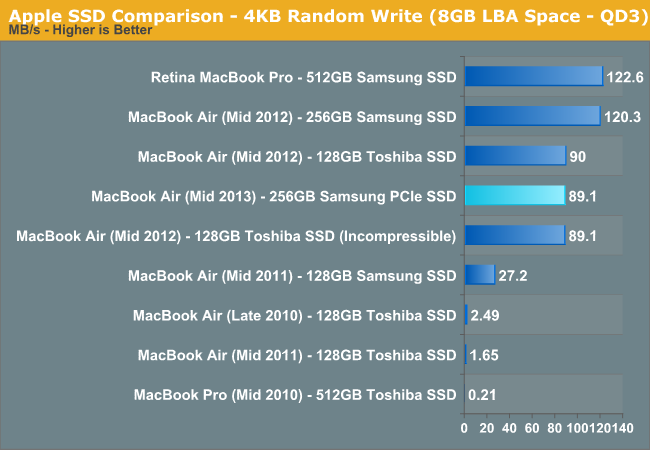
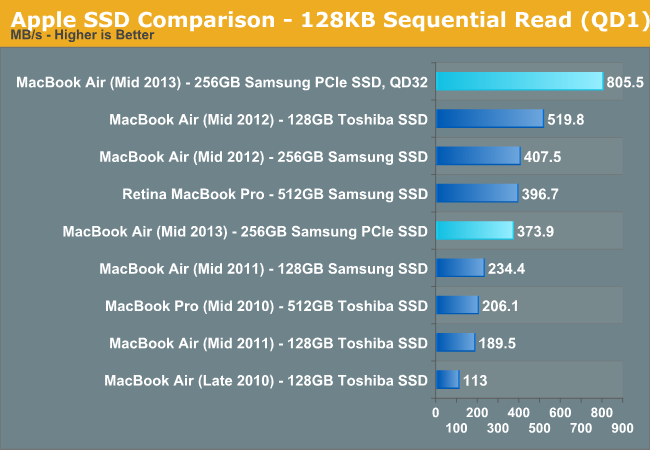
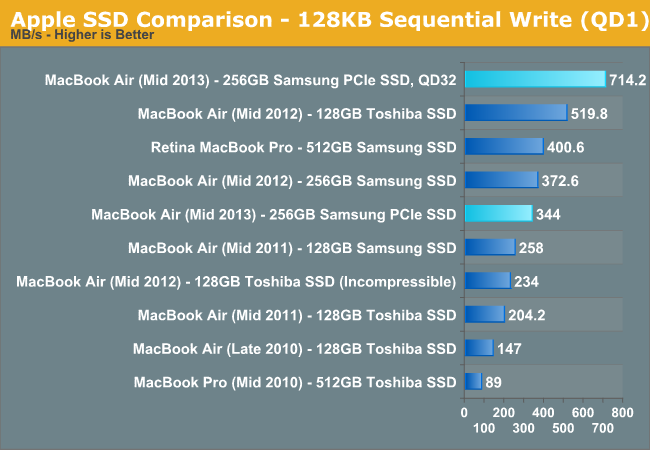
What does this mean in the real world? The new SSD is definitely snappier in system use. Wake from sleep is a bit quicker, as are application launches. The funny thing is that with the exception of high-speed Thunderbolt arrays, most external sources aren’t fast enough to even stress the new storage subsystem in the MacBook Air. Large file copies confined to the drive itself benefit a bit as well. I saw roughly 300MB/s reads and 300MB/s writes when copying a large dmg from/to the MacBook Air’s PCIe SSD (compared to roughly 200/200MBps on the old Samsung SATA SSD from the rMBP15).
If you have an external Thunderbolt array with at least a couple of drives, you should have no issues matching the MBA’s internal SSD performance.
Seeing as how this is our first experience with Samsung’s PCIe SSD controller, I wanted to get a feel for how the drive behaved under extended high queue depth random writes. I ran a modified version of our IO consistency test. The test was modified to run in a 91GB space on the MBA’s Boot Camp partition. I made sure to fill the rest of the drive completely, but the random writes were effectively constrained to 91GB of LBAs. When I get back from the UK I’m going to try setting up an external boot drive and will do some more extensive testing on the drive.
The IO consistency results, at least within a somewhat constrained space actually look really good. I have a feeling that Samsung might have improved its IO consistency story with this generation, but I’ll wait on saying for sure until I’ve had a chance to do some more work with the controller. For the vast majority of users however, solid random write performance like this over a 91GB space on a full drive is actually very good news.


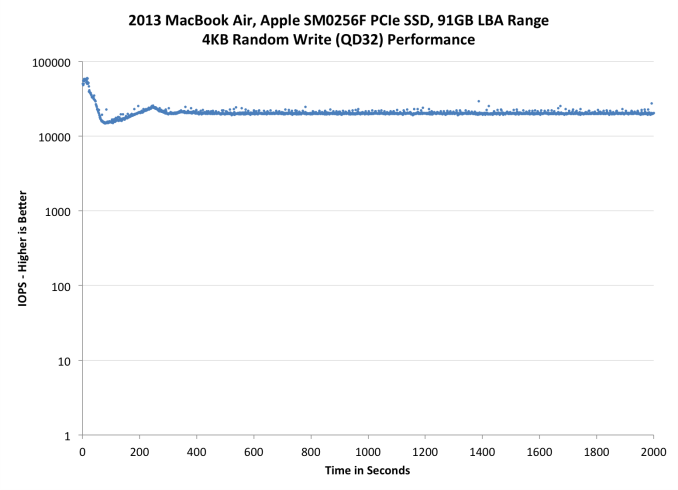
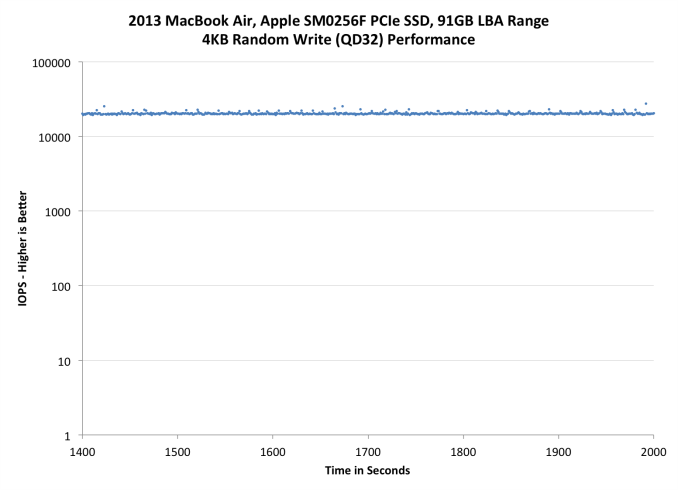
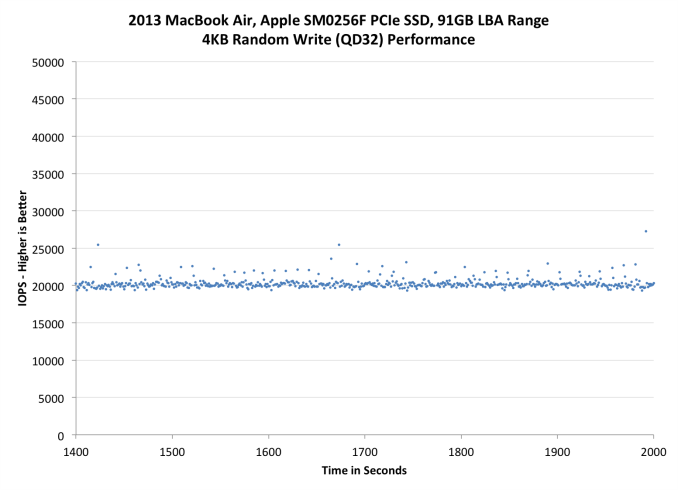








233 Comments
View All Comments
darwinosx - Monday, June 24, 2013 - link
They are not biased and you don't understand the meaning of the word.MonkeyPaw - Monday, June 24, 2013 - link
Just a thought, but how about stating your concerns via constructive criticism or in the form of a question. Crying bias while continuing to visit (and therefore, support) any website just doesn't make much sense since you will be dismissed as a troll by the very people you are hoping to influence.CalaverasGrande - Monday, June 24, 2013 - link
Frankly I think users that expect to play heavy 3D games on a MacBook Air with chipset video bought the wrong computer. They should have spent a few hundred more for a 15" MBP with discrete graphics. Or if they really care about games they should hop the fence and go get an Asus or some other Windows gaming notebook.Intel's HD4000 graphics are better than previous Intel video attempts, but still pretty weak compared to other vid chips. It's also using system ram, not dedicated ram.
As stated, this is the mobility platform, not the performance platform.
CalaverasGrande - Monday, June 24, 2013 - link
oops, HD5000.darwinosx - Monday, June 24, 2013 - link
Nobody does. But the HD 5000 is quite capable for some games.hyrule4927 - Monday, June 24, 2013 - link
The lack of thermal data in these Mac reviews is rather frustrating. If this data is included in all other PC reviews in Anandtech, why is it completely ignored when reviewing Apple products? They certainly aren't immune to heat/throttling problems.darwinosx - Monday, June 24, 2013 - link
You didn't read the article you are commenting on.hyrule4927 - Monday, June 24, 2013 - link
If you would like to tell me where specific CPU temperature data is given, be my guest. All I see is an anecdote about fan noise and speculation about throttling in several tests.darwinosx - Monday, June 24, 2013 - link
Prove that Samsung makes a better screen than LG. I bet you can't tell the difference.spronkey - Monday, June 24, 2013 - link
Samsung LCDs might have slightly better early quality control. LG Display have been a bit notorious for early run issues with their panels lately. But I agree - taking these away, LG has more cred as a panel maker than Samsung does.